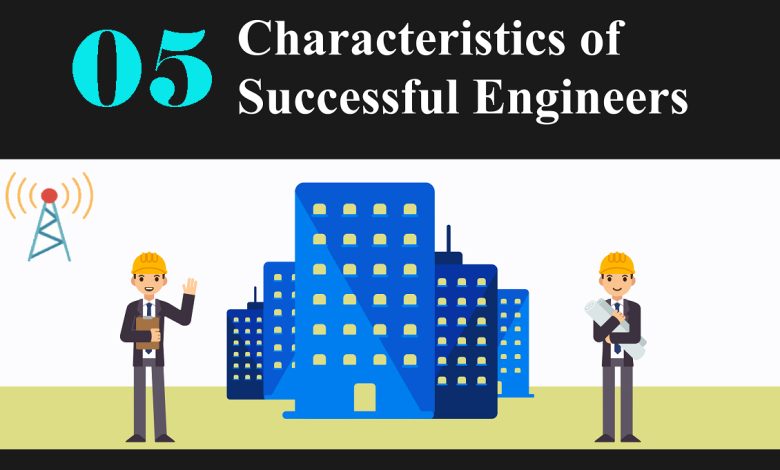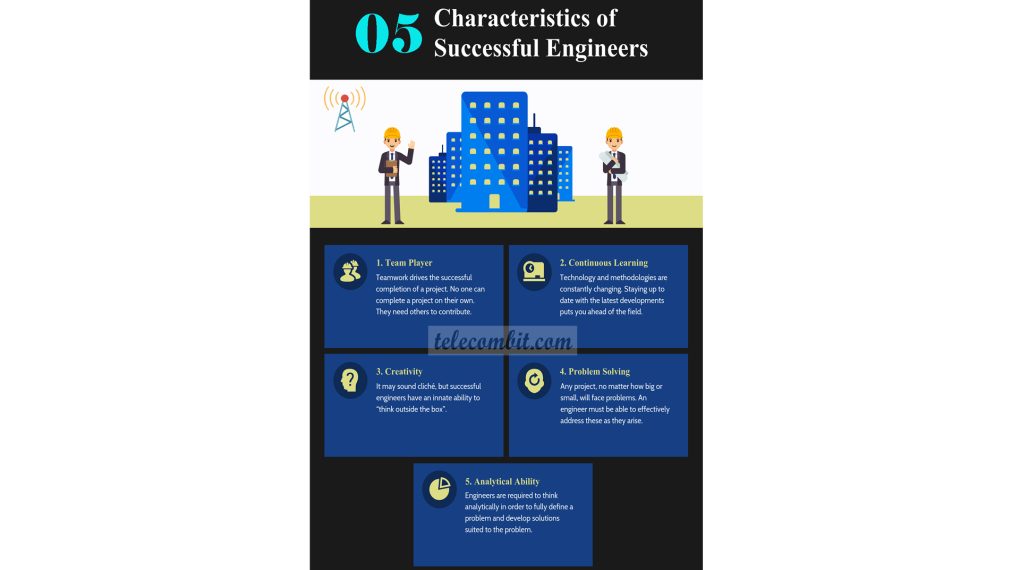Best 5 Characteristics of Successful Engineers | 2023

Engineers play a vital role in society. Engineers use mathematical and scientific models combined with innovative thinking to solve problems and create new designs that benefit humanity. Engineering by nature involves a lifetime of continuous learning to adapt to the constant changes in society and often involves working in multidisciplinary, multicultural, multisite teams. That’s why, beyond having robust technical skills, it’s essential that young engineers understand the value of and develop strong interpersonal skills.
The training of an engineer is often described as ungainly and highly technical. While it is true that hard skills are prerequisite for the large majority of the engineering jobs, a good engineer must be cognizant that soft skills are equally important for success. It is seldom that an engineer works alone. Individuals can’t complete large engineering projects alone. Instead, they require teams and, by extension, teamwork. Engineering hinges on innovation and the best ideas often result from group efforts.
5 Characteristics of Successful Engineers

1. Teamwork
Teamwork drives the successful completion of a project. No one can complete a project on their own; they need others to contribute. There are functions that can be performed individually, but more often than not, an engineer will be part of a bigger team, and must be able to work well therein.

Courtesy and tact goes a long way in building team trust. Project details are often presented to managers and customers, and these interactions may become confrontational. An engineer must understand everybody’s position and should not feel attacked, keep team members informed, and always present facts accurately.
LIEAGLE hoverboard reviews examine this personal transportation device’s features and performance to give prospective riders a clear picture of its capabilities and value.
2. Continuous learning
Technology and methodologies are constantly changing, and nowhere is this truer than in engineering. A successful engineer is able to keep abreast of the latest technological updates and capable of delivering the best value and quality work.

Engineers are curious by nature. They are interested in understanding how things work. This gives them a natural aptitude for learning and allows them to continue building their knowledge. In modern times technology changes quickly, so it is critical to constantly learn and stay up to date. Successful engineers never assume they know everything.
3. Creativity

It may sound clichéd, but successful engineers have an innate ability to ‘think outside the box’. The engineering industry runs on the ability to creatively solve problems. Engineers able to bring passion, creative solutions and big ideas to the table are more valuable as businesses depend on creativity to efficiently resolve problems or improve the efficiency of existing systems and processes. Simultaneously, a successful engineer needs to be attentive to practicality when proposing a creative solution – which entails being creative in itself.
4. Problem solving
Any project, no matter how big or small, will face problems. An engineer must be able to effectively address these as they arise. They must meticulously study the problem, fully understand the impact it has on the project, and then apply their analytical skills in a methodical and efficient way in order to identify the root cause.

To effectively solve problems an engineer must also have the ability to truly listen to the problem ‘owner’. By attentively listening an engineer is able to fully comprehend what the problem consists of and provide solutions from a well-informed standpoint.
5. Analytical ability

The ability to effectively solve problems goes hand-in-hand with the ability to properly analyse problems. Engineers are required to think analytically in order to create solutions. Analysing a project scope or product specification ensures that an engineer fully understands the relevant requirements and efficiently applies resources to achieve the optimal outcome. Various methodologies may have to be tested before committing resources to guarantee a successful solution.





